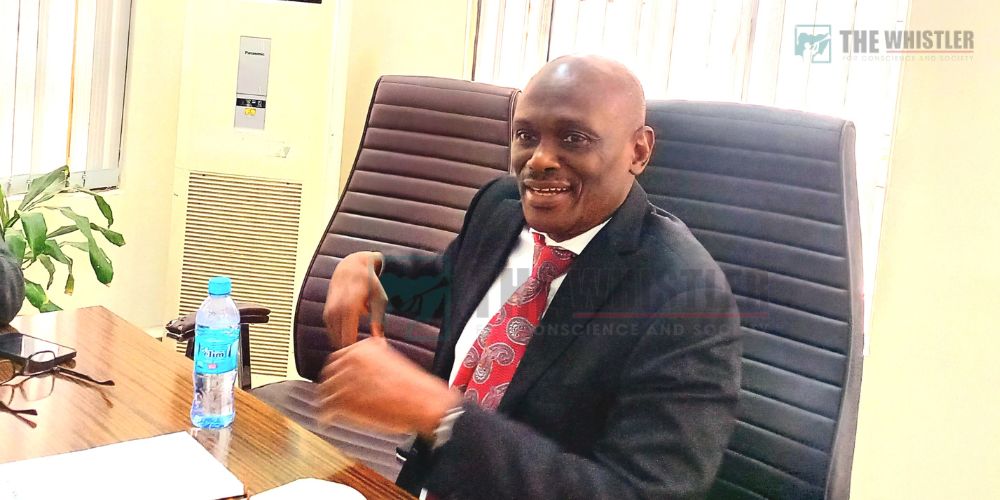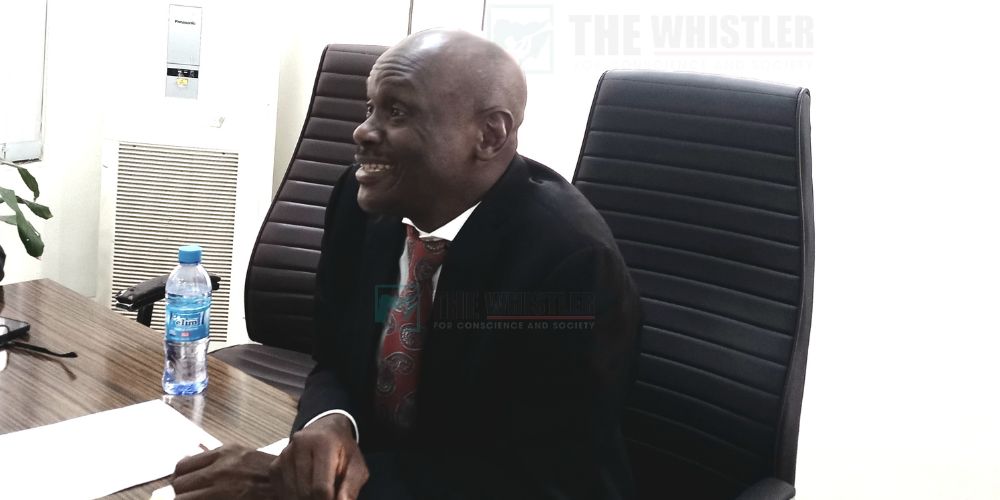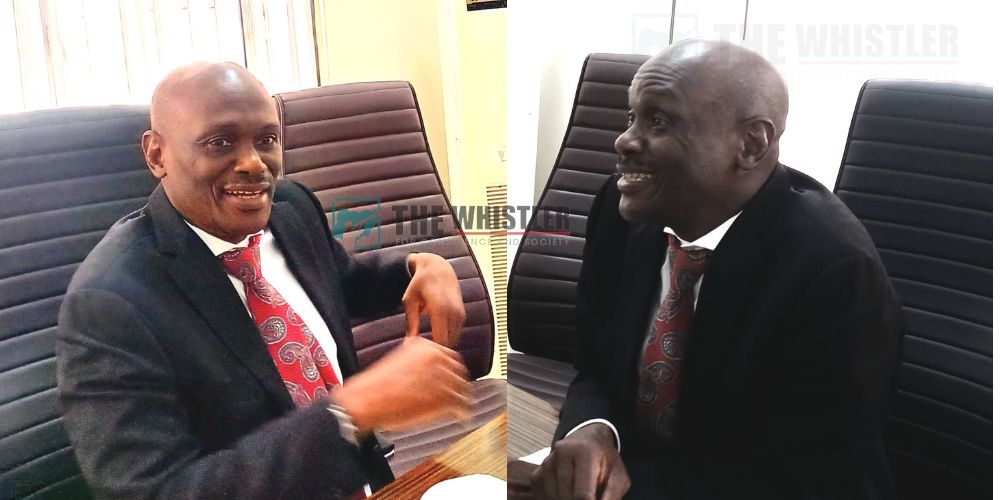INTERVIEW: Some Nigerians Diverted Part Of FG’s N555bn Intervention Loan To Marry, Bought Iphones— NIRSAL MFB MD
When Abubakar Abdullahi Kure was appointed to take charge as the Managing Director/Chief Executive Officer of NIRSAL Microfinance Bank in 2020, the country was already heading to a recession induced by the Covid-19 lockdown and the former administration led by Muhammadu Buhari needed intervention programmes that will help the country exit recession.
Kure joined the bank from the Central Bank of Nigeria, where he had served in various departments of the CBN, including Banking Supervision and Other Financial Institutions Departments, among others.
Advertisement
But he had to face a new challenge of balancing financing support for MSMEs, big corporates, as well as agricultural financing for Africa’s biggest economy.
In this interview with THE WHISTLER, the MD /CEO of NIRSAL MFB, Kure gave insight into the challenges of managing a multi-billion government-owned Special Purpose Vehicle (SPV) set up to provide financial intervention for businesses and farmers. He also spoke on issues around the impact of foreign crises on loan recoveries.
Excerpt…
You have a delegation from Mozambique who are keen on learning the NIRSAL MFB model. Do you feel inspired?
Advertisement
It is a model that we have built. It is our experience. It is our achievements that they want to ride on. For us, we are honoured that our sister African country is coming to understudy what we have done. It shows that we have done well and that there is room for improvement ranging from tracking monitoring and ensuring funds are delivered to the right people. But overall, we are happy to be a model for other countries.

NIRSAL has been pivotal in agricultural finance and other development programmes. So far, how much has been disbursed?
For the Anchor Borrowers Programme (ABP), we have disbursed about N39bn ($26m), for the Agri-Business/Small and Medium Enterprise Investment Scheme (AGSMEIS) fund, we have disbursed about N118bn ($79m) and for the Targeted Credit Facility (TCF) which is not just Agric but a composition of various sectors, we have disbursed N398bn ($265m).
Nigeria is facing a severe forex crisis. How is it affecting your institution and ability to lend?
Advertisement
Yes, our ability to lend is constrained because cashflow is going down and the economy is facing stress in terms of cash flows and businesses are being affected for instance, if you want to import certain things as a businessman, you know that your purchasing power has gone down so, you need to look for more naira and also, we are scared around the ability to repay loans.
The danger of the exchange rate going up is that you find out that businesses that take loans may not be able to pay back because their cost of production will go up. But I understand that the CBN is doing a lot and trying all the dynamics to see how they can properly manage the exchange rate. We hope to see light at the end of the tunnel.
What are the challenges you are facing with loan disbursement under the ABP, TCF, and AGSMEIS?
The major challenges are around recoveries because people have the perception that because it is government money, they are national cake. But thanks to the CBN for coming out with the Global Standing Instruction. We are using that technology such that irrespective of where you have your money, once your loan is far due, we trigger it, then we will recover our money and you may not be able to take a loan within the banking system if you don’t pay.
So, the Credit Risk Management System (CRMS)and the Global Standing Instruction are helping. We are also making a campaign to educate people on how GSI works. We are also doing a campaign for people to know that the loan we are giving is not a grant – it is a loan.
The issue of transparency is a challenge. The issue of recovery is a challenge. Unfortunately, there is a lot of insecurity and banditry. So, when you give somebody a loan, they will tell you they can’t go to the farm because bandits have taken over the farm and they are kidnapping people. In some areas, they have to even pay a token before they can farm.
Advertisement
How much have you recovered so far, and what are the issues around non-performing loans?
We have recovered within the range of 20 per cent of all the loans, and with the GSI, we will get tractions. We have also involved security agencies to help in recovery. We have also engaged debt recovery agents to assist in recovery. So, with all those dynamics, we hope to get traction with the recovery rate.
With the hardship, what are the incentives you plan for customers?
We have given incentives already. The loans we gave were supposed to be for three years, and a moratorium came in, and it was extended, and the interest rate is already low. The loans we give here are at nine percent, and you can’t get it anywhere. The intervention fund is given as low as 9 per cent while banks give as much as 30 per cent depending on your risk profile. So, for us, the repayment period is the incentive. Let the farmers use it very well to deliver on the purpose of the loan.
There are conversations about writing off government agricultural intervention loans. What is your take?

There is pressure in the country to write off the loans, but in the last session I had with the CBN management, I advised against it. I will not support it. I don’t support it for the reason that it is a moral hazard. Any time the government or banks come out with a loan or intervention; people think it is a grant that they will not pay back.
My stand is that we should recover as much as we can because if we say write off the loans, it is not every Nigerian that got the loan for God’s sake. Nigeria has a population of 200 million people, and maybe only a little over a million got the loans. What then happens to those who did not benefit from the loan?
If it is on equal share, I would have supported the agitation to write off, and some people did not make meaningful use of the loan. Some people divert it to go and marry women and buy iPhones and things that are not asset generating, so people should pay back. Some used it to buy forex to acquire a house in London or the US. Sorry to say.
When you write it off, anytime the government comes with a loan, they will not use it well, they will divert it to other things, thinking the government will come back and write it off again.
How did you conclude that Nigerians diverted the funds to marry and buy iPhones?
Yes, we have market information. The bank relies on market information to get some of these things, and that is why we use GSI to recover because some of them are actually in remote places. To get across to the obligor with small ticket loans, the cost of recovery will be high, so we use technology via GSI to make recoveries.
The experience we have around that is because they were not able to pay, we asked the Nigerian Financial Intelligence Agency to investigate how they utilised these funds. A lot of them used it for other things.
What new things are you bringing on board to NIRSAL MFB this year?
Currently, we are also doing our balance sheet. We create assets from the public by way of deposits and lend them as loans and advances to the public but at a commercial rate. That one is now available, and we are trying to get traction, and farmers are also welcome. But unlike intervention funds, this one is defined. It goes through a rigorous appraisal for someone to qualify.
You have to talk about your cash flow, your ability to pay back, your collateral has to be available, guarantors, and business experience. All these will be considered, and those who are serious can come for that.



